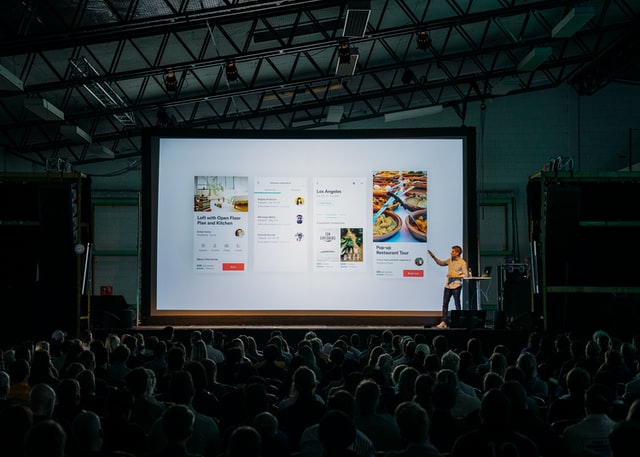A few short months ago, large conferences were de rigueur for many sectors. From B2B trade fairs and events to corporate AGMs to events for the public, they were a feature of life for many. Understandably all these events disappeared as Covid-19 took hold. 2020 has become the year of lost conferences! Even now, with mass gatherings likely to be the very last feature of our old lives to return, the future for these large events is unclear.
Conferences can play a vital role in the business world. They provide an opportunity for players in a market to showcase their own products and skills, network with potential customers, scope out the competition and see first hand the latest developments in their industry.
THE TURN TO VIRTUAL
When many of these large conferences were cancelled, some organisers endeavoured to find alternative ways of reaching those who were due to attend by embracing some virtual contact, with great success. For example, when IBM took its Think 2020 online – it set company records for the most attendees at a digital-only event with over 100,000 clients and business partners registered to attend. FSTL has been involved in transcribing these types of events throughout the course of the pandemic. Recently we transcribed a conference held on zoom and were able to also transcribe the multiple breakout groups that were held on the platform. The delegates and organisers found the breakout groups worked quite efficiently and it was easy to organise.
Being able to go virtual when the world changed offered a lifeline to many events organisers. And indeed there will no doubt be a place for virtual meetings in the future world of conferences too. But many would argue that the experience of taking all of the benefits of running this type of event away and going online-only leaves most participants feeling a little underwhelmed. We’d suggest it’s likely that we’ll see a hybrid world where real life is supported by virtual (and vice versa!). For example, AGMs are a mandatory requirement for a number of companies including both public companies and private companies that are traded, and these are required by law to take place in a real world environment so they must take place in a conference style event.
But what is certain is that the way these conferences have run historically will have to change – at least in the short term until a vaccination is found.
HOW IS THE INDUSTRY PREPARING ITSELF?
Businesses are starting to look ahead at what might be able to run in the short and medium term, before things are able to return to normal. It’s likely that numbers of attendees will not reach pre-Covid levels for quite some time, partly because of a likely reluctance among some people to attend larger gatherings but also because social distancing measures may still be in place. Many event organisers will have learned valuable lessons to take forward from the Covid-19 experience:
- Detailed risk assessments are vital – even more so while the Covid risk is still out there and events are being planned. Organisers must not only be able to reassure everyone taking part that the event is safe, but they need to negate any risk of liability should anything Covid-related occur as part of the event.
- More than ever before, the value of having insurance in place has been highlighted during the pandemic. Protecting from cancellation or other related costs is an essential part of the planning process.
- The same applies to Force Majeure clauses in contracts – no doubt these will be very carefully scrutinised in future.
WHAT MIGHT THE NEW CONFERENCE WORLD LOOK LIKE?
Of course, we don’t have a crystal ball to know how long additional measures for larger conferences might need to be in place, but we can assume that until a vaccination is found, some forms of control will be required. So we anticipate seeing:
- Fewer large meetings, and more breakouts so that large numbers of people aren’t squeezed into one room
- Temperature checks and questions related to recent travel on arrival
- Clear screens between speakers and attendees
- Social distancing seating with chairs spread out and perhaps rows set up much wider apart
- Requirements to wear masks and hand sanitising stations set up
- No handshakes while networking
- No more buffet lunches or coffee stations! Drinks and food will be individually packaged and served.
- Marketing material to be digital-only
Whether your event is virtual or live, FSTL can provide a transcription service to help provide businesses with a valuable record of what took place, to assist with your post-event reporting or marketing requirements.
We are definitely looking forward to attending live events again before too long!!

